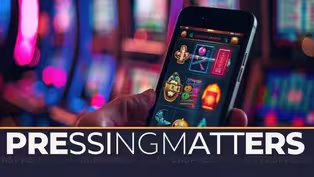Pressing Matters
Pressing Matters | Cryptocurrency
Clip: Season 2 Episode 2 | 7m 53sVideo has Closed Captions
Pressing Matters dives into cryptocurrency
Pressing Matters dives into cryptocurrency
Problems playing video? | Closed Captioning Feedback
Problems playing video? | Closed Captioning Feedback
Pressing Matters is a local public television program presented by WCMU
Pressing Matters
Pressing Matters | Cryptocurrency
Clip: Season 2 Episode 2 | 7m 53sVideo has Closed Captions
Pressing Matters dives into cryptocurrency
Problems playing video? | Closed Captioning Feedback
How to Watch Pressing Matters
Pressing Matters is available to stream on pbs.org and the free PBS App, available on iPhone, Apple TV, Android TV, Android smartphones, Amazon Fire TV, Amazon Fire Tablet, Roku, Samsung Smart TV, and Vizio.
Providing Support for PBS.org
Learn Moreabout PBS online sponsorshipchances are, you've heard of Bitcoin, often referred to as the world's first cryptocurrency.
Despite its volatility, some see it as a safer investment versus more traditional routes, because it's decentralized, meaning the government and banks don't manage it.
Understanding it is complicated.
You can't touch it and you can't see it.
It requires getting familiar with new forms of currency and involves navigating technology, economics, and digital finance.
To better break it down, we spoke with Sahil Goswami with Dart Bank.
Is it something you can see?
Is it something you can touch?
- Well, yes and no.
Technically no.
It lives online, it lives in the ledger.
It doesn't even have to be online.
But there are ways to store Bitcoin that don't necessarily require the internet.
It just requires something called cold storage, the ability to download your money literally onto the equivalent of a USB drive.
- And then what do you do with that online money?
- Well, that's the big debate.
A lot of people view Bitcoin specifically as a store of value, a hedge against broader markets, an alternative to gold.
Some view it as a means of transacting and some just view it as a speculative asset to try and make some money on.
- How long has Bitcoin or the idea of Bitcoin or even cryptocurrency been around?
- The idea of a virtual currency has been kicked around for decades.
It was brought up in the '70s and '80s around what it would mean to try and transact over the earlier versions of the internet in the late '80s.
But Bitcoin itself was a post '08 reaction to the recession, to a lack of faith in banks and a lack of faith in the idea that a central reserve bank or a central monetary authority could really dictate the supply of money and the value of what you held.
- Is Bitcoin the only cryptocurrency that's worth anything?
Or are there others that have kind of similar value?
- So when Bitcoin first came about, it was one of a kind, really all there was for many years that was true.
And then eventually we started to see others pop up.
Some more focused on enabling transactions, some more focused on privacy, some focus on international money movement.
As time has passed, the number of cryptocurrencies has gone from 10s, 100s, 1000s to millions.
And that's where we sit today.
There are millions of cryptocurrencies.
It takes the length of time, it took me to say the word word to create a cryptocurrency today, it's as easy as ever.
And you have folks creating them left and right.
- What is that creation process, the mining process?
And maybe those two are different... Two different processes, I'm not sure?
- So crypto itself seems to have been born alongside Bitcoin by the anonymous creator, Satoshi Nakamoto, who created Bitcoin, made it a fixed supply of 21 million to avoid inflation.
We still don't know the identity of that individual or group, but we do know that it exists.
It took off, it was very reactionary to the Great Recession.
And the way that the network broadly works and these miners and all these terms we hear about is that if I transact with you, that transaction's recorded on a public ledger, that's available worldwide and validated by these miners.
So these miners work to validate these transactions as well as solve these complex equations that discover newly minted Bitcoin as part of 21 million.
That supply is fixed.
The point is miners have a really important role.
They're there to validate transactions and help uncover new Bitcoin through these complex cryptographic equations that find new Bitcoin among the 21 million that will ever exist.
And that role requires a lot of complex equipment, but the rewards themselves are, as they validate these transactions and uncover the new Bitcoin, they get to keep that for themselves.
And that's the reward they get for validating these transactions.
- How do you become a miner?
- It's really easy.
Anyone can do it.
Anyone could do it.
The likelihood that you'll be able to mine Bitcoin while doing it, very limited.
Really requires a lot of complex equipment.
- Why is it considered so volatile compared to more traditional investments like gold or stocks?
- Well, gold, it's collateralized by the metal.
It is speculative on the idea that there is scarcity associated with gold.
And that means that the value does go up as you... As folks hedge against risk because it's been a hedge against risk for decades.
Fundamentally, volatility is always interesting.
And the idea that you can have a currency that is independent of any government, any bank and can be used by the same person sitting in New York or sitting in Seoul, is an appealing prospect for those who are looking for the idea of financial freedom.
I think the spirit of Bitcoin, the spirit of crypto is that you want the ability to do what you need to do.
And I don't know of anything more American than personal liberty.
- Do you think it'll ever stabilize or do you think there's always going to be kind of the sense of unknown?
- It's all a relative term.
Stable coins by design are meant to be stable.
- Yeah.
- A stable coin that's worth a dollar should always be a dollar.
The reality is, is that Bitcoin does not necessarily act on the idea of stability.
- So then do you think it's just a fad?
Or do you think it's going to continue to become a bigger part in our financial future?
- It's definitely the latter.
I think each time crypto has really been in that public spotlight, it's been a bigger wave.
So we've seen an ebb and flow where it's fallen out of favor, fallen into more of an area of disinterest and then come roaring back.
And we're seeing that happen more and more often where each time it comes roaring back, it really does capture a lot more interest, a lot more eyes, and a lot more folks willing to dive in and learn more.
Bitcoin is more accessible today than it ever has been.
You can buy the actual currency from an exchange, you can buy a derivative version of that through an ETF.
And I'd say the latter has become a little more recommended.
It's easier to do.
It's integrated directly into what a lot of people do today when they buy their stocks.
(dramatic music) - We do wanna stress, Sahil is not a financial planner and not providing financial advice.
For those who want to learn more about it, he strongly suggests educating yourself first and foremost.
Thanks for watching and thank you for your continued support for WCMU Public Media.
We'll be back soon with another edition of "Pressing Matters."
(dramatic music)
Pressing Matters | Online Gaming
Video has Closed Captions
Clip: S2 Ep2 | 5m 35s | Pressing Matters online gaming (5m 35s)
Pressing Matters | Rethink Drinking
Video has Closed Captions
Clip: S2 Ep2 | 5m 22s | Rethinking Drinking: How is Alcohol Impacting Your Body? (5m 22s)
Providing Support for PBS.org
Learn Moreabout PBS online sponsorship
- News and Public Affairs

Top journalists deliver compelling original analysis of the hour's headlines.

- News and Public Affairs

FRONTLINE is investigative journalism that questions, explains and changes our world.












Support for PBS provided by:
Pressing Matters is a local public television program presented by WCMU

